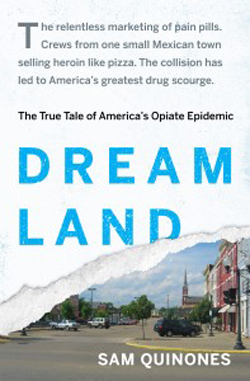
Journalist and author Sam Quinones will visit Nashville Nov. 5-7 to discuss his recent work on the U.S.-Mexico drug trade in a series of events at Vanderbilt and around the city. All events are free and open to the public.
On Thursday, Nov. 5, from 6:30 to 7:30 p.m., Quinones will give a lecture at the Frist Center for the Visual Arts titled “Crime and Remembrance: Stories from Mexico’s Druglands.” The talk will explore themes of loss and drug-related violence depicted in the Frist Center’s exhibit Phantom Bodies: The Human Aura in Art.
On Friday, Nov. 6, at 12:10 p.m., Quinones will host a lunch discussion with Vanderbilt students and faculty titled “How Heroin Makes its Way from Xalisco to Nashville” in Buttrick Hall, Room 123.
 To conclude his visit, he will participate in a reading and book signing at Parnassus Books (3900 Hillsboro Pk., Suite 14) at 1 p.m. Saturday, Nov. 7. Quinones will read from his most recent book, Dreamland: The True Tale of America’s Opiate Epidemic, a chronicle of how prescription painkiller marketing and a pizza delivery-like system for selling heroin collided with and led to a nationwide surge in opiate addiction.
To conclude his visit, he will participate in a reading and book signing at Parnassus Books (3900 Hillsboro Pk., Suite 14) at 1 p.m. Saturday, Nov. 7. Quinones will read from his most recent book, Dreamland: The True Tale of America’s Opiate Epidemic, a chronicle of how prescription painkiller marketing and a pizza delivery-like system for selling heroin collided with and led to a nationwide surge in opiate addiction.
Quinones was a freelance writer in Mexico for 10 years. His two previous books are True Tales from Another Mexico: The Lynch Mob, the Popsicle Kings, Chalino and the Bronx, a 2001 collection of stories from Mexico’s margins, featuring Oaxacan Indian basketball players, a colony of drag queens, popsicle makers, and slain narco-balladeer Chalino Sanchez; and Antonio’s Gun and Delfino’s Dream: True Tales of Mexican Migration, which includes stories of the Henry Ford of velvet painting, the Tomato King of Zacatecas, opera in Tijuana, a young construction worker making his way north, and Quinones’s own run-in with dope-trafficking Mennonites. He received an Alicia Patterson Fellowship in 1998 and is also the winner of a 2008 Maria Moors Cabot Prize, awarded by Columbia University for a career of excellence in covering Latin America.
These events are sponsored by Vanderbilt University’s Center for Latin American Studies.
Written by Jamie Marks